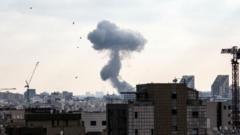President Trump ordered strikes on Iran’s nuclear sites without seeking Congressional approval, causing significant backlash from both parties. Critics argue this move nears a declaration of war and bypasses legislative authority, while the Trump administration defends it as a limited operation.
Tensions Rise as Trump Strikes Iran Without Congressional Approval

Tensions Rise as Trump Strikes Iran Without Congressional Approval
President Trump's recent military action against Iran has sparked controversy and debate regarding the legality and implications of his decision.
Before executing military strikes against Iran’s nuclear facilities, President Trump did not seek Congressional authorization, despite the Constitution designating war declarations solely to Congress. This action has raised alarm among many Democrats, and some Republicans, who deem the attack tantamount to a declaration of war, labeling Trump's move as unconstitutional.
In defense of the strikes, several aides within the Trump administration emphasized that the operation was targeted and did not constitute war. Secretary of State Marco Rubio asserted in an interview with Fox News that the actions aimed solely to address Iran's nuclear threats. Vice President JD Vance echoed these sentiments, stating Trump acted within his rights to prevent the spread of weapons of mass destruction.
However, Trump's social media commentary hinted at broader ambitions. He suggested in a post that if the Iranian government fails to improve the nation, regime change might be a viable outcome. This statement has fueled concerns regarding an escalation in military conflicts, especially following the recent Israeli military actions against Iran.
The rapid decision to strike has drawn criticism for depriving lawmakers and the public of adequate time to engage in discussions about America's future involvement in a conflict marked by volatility if Iran decides to retaliate. This situation unfolds amidst ongoing bipartisan efforts in Congress aimed at imposing stricter limits on presidential military authority, a response to the fallout from past U.S. military endeavors in the Middle East and Central Asia.






















